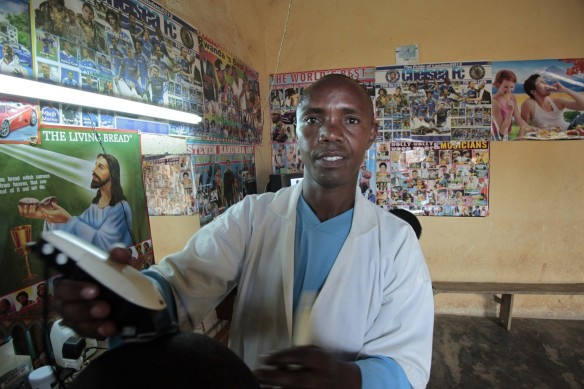Meet Aloys, the barber from Muruma
Aloys Nsabimana fires up his electric clippers and gets to work. Overhead, Chelsea FC’s 2013 line-up and a group of “new super stars” look down from a jumble of posters. A customer watches TV.
Squint hard enough and you’re almost in London. But this is Muruma village, Bugesera District, Eastern Province, Rwanda – in short, a world away – where the floors are swept clean but there’s no tile underfoot, just raw earth, and the posters conceal crumbling mud brick.
Business is buzzing
Ask Aloys how CARE and Hand in Hand have changed his life and he’ll happily count the ways. “Before I had nothing – nothing – to spend each day. Now I can spend 1,000 RWF (US $1.45) or 1,500 RWF (US $2.20) in a morning. I have a cow. I have a house. I have wife and five children. I can pay school fees, I can buy health insurance and when the children are sick, I can buy medicine.”
His secret: electricity. There are plenty of barbers in Bugesera District, but despite government plans to electrify 70 percent of homes and businesses nationwide by 2017, only one is connected to the grid. Want a buzzcut? Aloys is your man. Some TV? He’s got that covered, too. Factor in his side business charging mobile phones and the 40-year-old is making 180,000 RWF (US $260) a month – almost five times the national average.
A dark past
Aloys was 20 years old when the genocide literally decimated Rwanda, displacing an estimated 800,000 people and killing some 800,000 more. The country has come a long way in the 20 years since: in 2014, the UNDP noted Rwanda’s “accelerated progress” on 15 MDG indicators – the fourth most anywhere – and in 2017, the World Bank’s “ease of doing business” index ranked it 56th to Belgium’s 42 and Luxembourg’s 59. But there’s still a long way to go. Globally, Rwanda ranks 158 of 189 on the UN Human Development Index – and it gets worse. In rural Rwanda, home to Aloys and the rest of Hand in Hand’s entrepreneurs, poverty is three times greater than in the city.
The country’s dual fortunes – improving, but not fast enough – are neatly summed up in its education rates. Primary school enrolment is now above 98 percent, the highest in all of Africa. But more than three-quarters of students, 72 percent, don’t make it to secondary school.
A bright future
Aloys was one of them. Lacking education – though not the entrepreneurial spirit – he started off selling clothes in Kigali, then moved to the country to start his own farm when the venture failed to take off. When that failed too, he set up shop underneath a tree in Murama village, Ngeruka sector, and started cutting hair at 100RFW a pop. Finally, he’d found his calling.
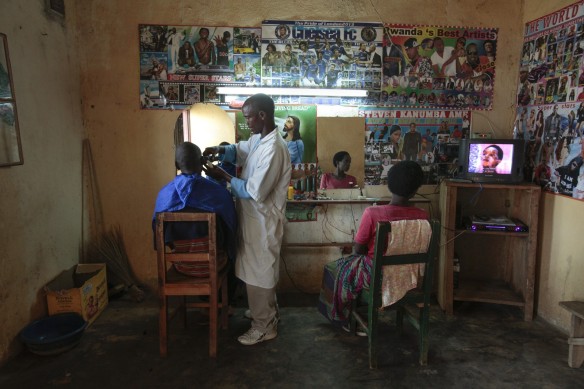 But it wasn’t until 2009, when he joined a local Village Savings and Loan Group organised by Hand in Hand field partner CARE, that he also found success.
But it wasn’t until 2009, when he joined a local Village Savings and Loan Group organised by Hand in Hand field partner CARE, that he also found success.
The going was tough to begin with. In the months following the group’s inception, Aloys and others could barely scrape together 150 RWF (US $0.20) per week. Today, having all met success, they’re each saving 500 RWF (US $0.70). It was a loan for 280,000 RWF (US $400) that enabled Aloys to start his first barbershop, still going strong with help from two employees, at home. Buoyed by his initial success, and with help from a Hand in Hand business trainer, he next applied for a loan of 500,000 RWF (US $700) from the Savings and Credit Organisation.
Plans to expand
Aloys knows he won’t be the only barber in Bugesera with electricity for long. That’s why, ever the entrepreneur, he plans to take a course on cutting women’s hair just as soon as he becomes debt-free. A third loan will follow, this one to pay for the resulting equipment. He’ll probably get some new posters, too.
Aloys’ results
Possible to provide health insurance and medicine for his family
![]()
Monthly income of 180,000 RWF (US $260) – almost five times the national average
Able to send all of this children to school
Hand in Hand Eastern Africa and CARE Rwanda are co-operating to empower some 100,000 Rwandans, mostly women, to work their way out of poverty by running their own sustainable businesses. The three-year, US $3.2 million partnership is grounded in our shared belief in the power of entrepreneurship to fight poverty.
Meet Zacharie, the salesman from Rwinkwavu
Ambition, the gift of gab, a relentless work ethic – Zacharie Itegekaharmde has all the traits of a born salesman. What he didn’t have was capital.
Then he found Hand in Hand.
Limited progress
Until a few years ago, Zacharie lived with his brother and elderly mother as one of the almost 80 percent of Rwandans who farm for a living, many at the subsistence level. Stuck on a cramped plot in the Eastern Province village of Rwinkwavu, the family struggled to eat three meals a day. “The farming was just for survival,” he says. “We could not get enough food to eat. We used to make and sell banana beer so that we could afford to buy clothes.”
Rwanda has come a long way since the 1994 genocide claimed some 800,000 lives. The country made “especially impressive progress” on a number of UN Millennium Development Goals, particularly in the areas of extreme poverty reduction and primary school education. But there remains a hugely long way to go. On the UN Human Development Index, for example, Rwanda ranks a sobering 158 of 189.
Sell phones
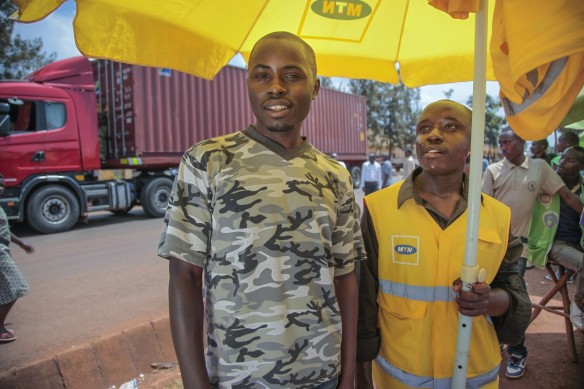 Life changed the day a sceptical Zacharie was persuaded by friends to join a Village Savings and Loan Group established by Hand in Hand partner organization CARE. To his surprise, admits the 25-year-old, the training was interesting. Better still, it was useful. “You learn that if you get a loan it is not to solve your problems but to make money,” he says. That’s exactly what he’s doing.
Life changed the day a sceptical Zacharie was persuaded by friends to join a Village Savings and Loan Group established by Hand in Hand partner organization CARE. To his surprise, admits the 25-year-old, the training was interesting. Better still, it was useful. “You learn that if you get a loan it is not to solve your problems but to make money,” he says. That’s exactly what he’s doing.
The Rwandan telecoms market is exploding. Between 2005 and 2010, the number of families with at least one cellphone grew 39 percent, climbing past 45 percent from only 6.2. By 2013, cellphone penetration countrywide was more than 61 percent.
Zacharie didn’t need business training to spot the opportunity. In fact, he’d been selling cellphone products on the side for years, making all but enough to invest and expand. Getting a loan from his savings group was easy enough. Pitching South African telecom company MTN for an exclusive airtime card distribution deal was harder. But armed with the skills he’d learned in his group from a Hand in Hand trainer, Zacharie pulled it off. Today his ‘patch’ spans a 125-mile radius, an area so big he’s had to hire help. Even better, his income has skyrocketed to 110,000 Rwandan francs (US $160) a month – almost three times the monthly national average of 37,000 RWF (US $55).
The resulting lifestyle change has been immense. Not only has Zacharie built a brick home, he’s furnished it – just in time for his upcoming wedding.
Zacharie’s results
![]()
Increased monthly income to 110,000 Rwandan francs (US $160)
Hand in Hand Eastern Africa and CARE Rwanda are co-operating to empower some 100,000 Rwandans, mostly women, to work their way out of poverty by running their own sustainable businesses. The three-year, US $3.2 million partnership is grounded in our shared belief in the power of entrepreneurship to fight poverty.
Meet Sam, the barber from Nyabikenka
Sam Nsengimana was 7 when news of his mother’s murder came through the radio. By the time the genocide was over less than three months later 800,000 people had been killed in just 100 days.
Sam, who fled to Tanzania with a relative, was one of the lucky ones. “I grew up in an orphanage and no one to help me,” says the 27-year-old. He later returned to Rwanda and moved in with his grandparents in Nyabikenka village, Eastern Province, where he still lives today. The better life he’d been hoping to find was elusive at first.
Moving forward, slowly
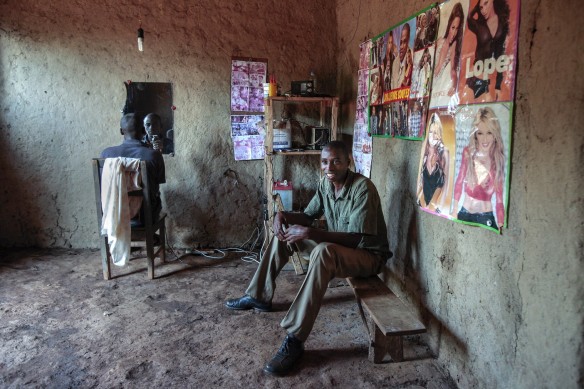
Rwanda is a study in contrasts. On one hand, the east African country of 11.5 million was a rare MDG success story, posting significant gains across the board. With primary school enrolment comfortably above 98 percent, for example, it’s no wonder that the UNDP calls the country “especially impressive”. On the other hand, more than a third of Rwandans live in extreme poverty, particularly in rural areas.
Until recently, Sam – along with his daughter, brother and 76-year-old grandmother Marie – was one of them. Sure, the family of farmers earned an income during harvest. But in between yields, for four months at a time, they had nothing. “I couldn’t even afford health insurance or a mattress to sleep on,” says Sam. Then, in 2011, he joined a Village Savings and Loan Association organised by Hand in Hand field partner CARE.
A helping hand
The going was tough to begin with. Some months, Sam couldn’t afford his contribution to the group’s savings fund. But he persisted, and eventually borrowed 250,000 RWF (US $365) to set up a barbershop. Thanks in part to help from his Hand in Hand trainer, it’s been a massive success. “I’ve never been able to have 100,000 RWF (US $148) in my pocket,” he says. “Today I can count up to 200,000 RWF (US $295).”
With side businesses in farming and mobile phone charging, Sam has been able to hire an employee from outside his family, furnish the family home and put money aside for his daughter’s education. He also has plans to open a second barbershop in the nearby town of Kabarandou and start yet another business selling produce.
“I live a better life today,” he says. “I have peace of mind.”
Sam’s results
Hand in Hand Eastern Africa and CARE Rwanda are co-operating to empower some 80,000 Rwandans, mostly women, to work their way out of poverty by running their own sustainable businesses. The three-year, US $3.2 million partnership is grounded in our shared belief in the power of entrepreneurship to fight poverty.
Meet Rahabu, the shop owner from Nyarubuye
Five years ago, Rahabu Mukampenda couldn’t get credit. Today, she provides it. And to think it’s all down to a few simple skills she learned at a Village Savings and Loans Group.
Tomato catch-up
Stop by Rahabu’s bustling shop in Burembo village, Rwanda and there’s a few things you’ll quickly notice. First, the variety of stock. The 44-year-old started out in 2010 with a crop of tomatoes she’d grown herself, having noted their popularity in nearby markets, but today her bestsellers range from cooking oil to body lotion, each chosen to satisfy customer demand.
Second is the abundance of customers. There are two nearby shops in Rahuba’s corner of Nyarubuye district, Eastern Province, but neither is as conveniently located. As a result she nets 20,000 Rwandan Francs (US $30) a month.
A long way travelled, a longer way to go
The human cost of Rwanda’s genocide is well-known, if inconceivable: over the course of 100 days in 1994 an estimated 800,000 were killed, literally decimating the country’s population. The economic cost is underreported, if staggering: in ’94 alone, growth dropped by 50 percent while inflation rose to 64 percent. The plunge helps explain how, despite high growth rates and decreasing poverty, the country remains one where almost 80 percent of the population is involved in farming, most at the subsistence level.
Rahabu was one of them. Back in 2009, before she joined a Village Savings and Loans Group organised by Hand in Hand Eastern Africa field partner CARE Rwanda, the mother of seven daughters aged 6 to 23 tended a small patch of land for 12 hours a day, growing just enough for the family to eat once daily. Soap, new clothes and secondary school fees were out of the question.
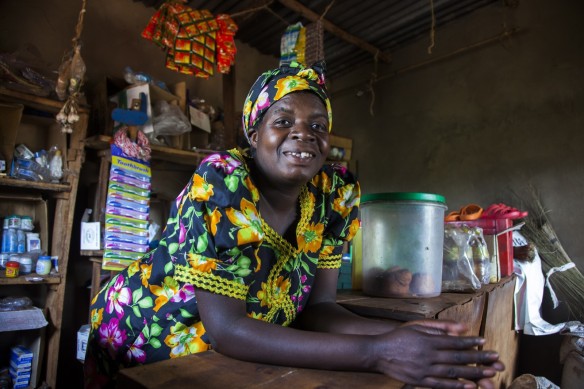 When she first joined the group, Rahabu worked for others to earn the 400 RWF (US $0.60) in required weekly savings. Discipline came easy. “You sometimes go to market to buy beans but when you are there you see something else that you would like and so you spend more than you meant to,” she said. “Because of the training I learned to buy what I need and save the rest.”
When she first joined the group, Rahabu worked for others to earn the 400 RWF (US $0.60) in required weekly savings. Discipline came easy. “You sometimes go to market to buy beans but when you are there you see something else that you would like and so you spend more than you meant to,” she said. “Because of the training I learned to buy what I need and save the rest.”
Having learned how to save, Rahabu soon graduated to learning basic financial and marketing skills. Now she’ll hold on to stock until prices rise, or extend credit to customers who can’t afford the essentials.
The dish
Back at home, things have changed immeasurably. Rahabu didn’t just buy dishes – she bought cupboards to store them. She even bought a modern stove. Even better, she says, her four youngest children will attend secondary school – a first in the family. With success like that, Rahubu’s husband Mutabagisha has been happy to take over the family farm. And Rahabu? She’s busy puzzling over her next move: how to expand her business.
Rahabu’s results
In 2013, Hand in Hand Eastern Africa and CARE Rwanda co-operated to empower some 100,000 Rwandans, mostly women, to work their way out of poverty by running their own sustainable businesses. The three-year, US $3.2 million partnership was grounded in our shared belief in the power of entrepreneurship to fight poverty.
Meet Florida, the young mother saving to put her children through school
So often, beneficiaries in the developing world are reduced to cold numbers. But ask Florida Mukarugema what’s been the biggest change since she opened her shop and her answer won’t fit on any graph. “I am feeling happy. I am no longer crying.”
Florida joined a Village Savings and Loan group organised by Hand in Hand field partner CARE in 2009, driven, like so many others, by sheer desperation. “We used to eat just once a day, in the evening. We didn’t have our own home but stayed with others. I couldn’t even afford a bunch of bananas,” she says.
How things have changed. Today, bananas are Florida’s bestselling item, the staple around which the young mother built her growing business, which also sells rice, maize flour and more. Recently, with help from a Hand in Hand business trainer, she borrowed 108,000 Rwandan francs (US $158) to build a water facility and sell clean water. Tally her earnings from both and Florida’s annual income is 1,200,000 RWF (US $1,760), almost ten times what she made previously and three times the gross national income per capita.
A country rebuilds
Life in Rwanda has improved beyond description in the 20 years since genocide convulsed the country, claiming some 800,000 lives in just 100 days. The economy is growing at upwards of 8 percent a year. Rwanda was- “top-performing” at the Millennium Development Goals, according to the UN. Social progress, evinced by the world’s greatest proportion of women MPs – 64 percent – has been undeniable. And yet there remains a hugely long way to go.
Florida’s neighborhood
Rural Rwanda, home to Florida’s Eastern Province village of Kinamba, experiences three times more poverty than urban Rwanda. Countrywide, more than 80 percent of Rwandans are engaged in agriculture, many at the subsistence level. And almost a third of Rwandans are considered undernourished by the International Food Policy Research Institute.
Savings and loans
Florida was one of them. Then she borrowed 15,000 RWF (US $22) from her Village Savings and Loan group and bought three bundles of bananas, which quickly sold for 28,000 RWF (US $41). Buoyed by a series of ever-bigger successes, Florida went on to borrow 200,000 RWF (US $294) from her group to open a shop.
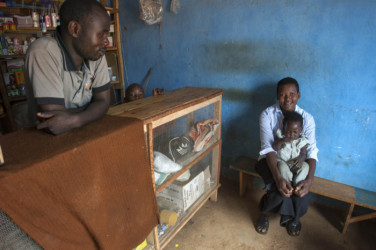
“Before I joined the group I was not even able to buy salt,” she says. “I did not know how to use the bank and I did not understand how to buy and sell and make a profit.”
Today, Florida, her husband and the couple’s four children – two of whom are adopted – live in a furnished three-room home with clean water. “I will make sure they go to university and then live in a nice place,” she says.
Florida’s results
Annual income of 1,200,000 RWF (US $1,760) – 10 times her previous income
200,000 RWF (US $290) in savings
Saving to pay for children’s university fees
Hand in Hand Eastern Africa and CARE Rwanda are co-operating to empower some 100,000 Rwandans, mostly women, to work their way out of poverty by running their own sustainable businesses. The three-year, US $3.2 million partnership is grounded in our shared belief in the power of entrepreneurship to fight poverty.
Business heats up for chilli farmer Marie Consolee
The 1994 genocide in Rwanda took Marie Consolee’s husband and child. For almost 20 years, it also took her ability to hope. But on a hot, still day in January 2014, the one-time teacher from Kiziguro village finds herself dreaming of a better future. “I am no longer begging for things or money. I can get what I need on my own.”
So what’s changed?
An unspeakable past
Rwanda has come an immensely long way since the 1994 genocide claimed some 800,000 lives. Poverty is decreasing rapidly – almost 12 percent between 2006 and 2011 – and the country’s primary school enrolment rate, 98.7 percent, is the highest anywhere in Africa.
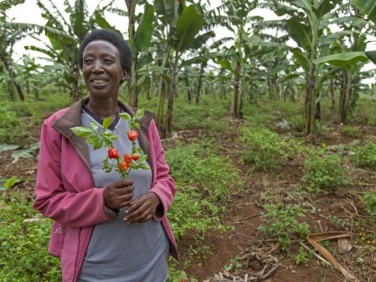
But for every reason to be optimistic there’s a reminder of just how it has left to go: 40 percent of Rwandans still live in extreme poverty, and secondary school enrolment is only 21 percent. In rural Rwanda, home to more than 80 percent of the population – including Marie – poverty rates are three times higher. Almost 14 percent of rural dwellers are landless peasants living in extreme poverty.
Before the genocide, Marie was a teacher in Northern Province. Afterwards, as one of 800,000 refugees and displaced people, she withdrew to the tiny Eastern Province hamlet of Kiziguro with her remaining son and newly orphaned nieces. The plan was to settle into a quiet, isolated life living off a small plot of land she’d inherited from her mother. In practice, the family of five found themselves begging for food from neighbours as part of the 28 percent of Rwandans classified as ‘food-insecure’. Occasional day labour in the fields meanwhile brought in a handful of francs a day – enough, most months, to total about 30,000 Rwandan francs (US $40).
Kiziguro, Rwanda
A brighter future
The family scraped by until 2009. Then Marie joined a Village Savings and Loan group organised by Hand in Hand partner CARE and, gradually, everything changed. But first she had to cut down on the sugar. “Instead of spending 500 RWF (US $0.70) on sugar, I would spend just 300 RWF (US $0.40) and so find the 200 RWF (US $0.30) I needed each week for the group savings fund,” says the 53-year-old.
“I changed my life”
Nine months later, after the group of 30 villagers had saved enough to start funding micro-businesses, Marie was among the first to apply for a loan. Knowing that chilli peppers always sold for a good price, she borrowed 50,000 RWF and bought her first seedlings.
The weather that year was unusually dry. But Marie, with “more friends and a bigger network than before,” was feeling unusually confident. When her seedlings were threatened, she borrowed another 70,000 RWF to hire help carrying water from the local pump. The investment paid off: Marie netted 480,000 RWF (US $700) that first season, enough to pay off her loans and purchase new land. Today, having diversified to grow chillies and bananas, her annual income has increased almost eight-fold to 3,840,000 RWF (US £5,520). And depending on the time of year she employs as many as 16 neighbours.
New hope
And there’s no plan to stop there. To stay ahead of her competitors, Marie has begun saving the 800,000 RWF (US $1,000) she’ll need to build a water tank. After that, she can start her own nursery and begin selling thousands of seedlings for 10,000 RWF (US $15) each. “I changed my life,” she says.
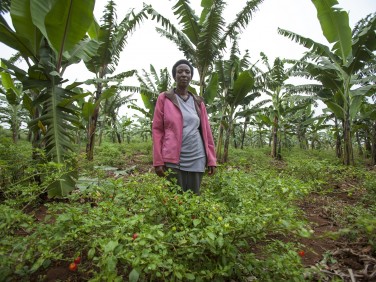
She also changed her home. In isolated Kiziguro, 10 bumpy miles off the main road from Kigali, most houses are made of mud and tree stumps. Not Marie’s. “I have cement walls and floors so it’s clean and nice,” she says. “There’s also enough food and my family can afford health insurance.”
But perhaps the biggest change of all has been internal. “At local meetings neighbours and government officials want to hear how I changed my life,” says Marie, who’d once lost hope. “I am now a counsellor and advisor on how to start a small business to people in this village and beyond. I am a role model.”
Marie’s results
Annual income increased almost eight-fold to 3,840,000 RWF (US $5,520)
Employs up to 16 neighbours
New home and health insurance for her family
Hand in Hand Eastern Africa and CARE Rwanda are co-operating to empower some 80,000 Rwandans, mostly women, to work their way out of poverty by running their own sustainable businesses. The three-year, US $3.2 million partnership is grounded in our shared belief in the power of entrepreneurship to fight poverty.
Meet Maida, the supercharged entrepreneur
The first thing you notice at Maida Mushimiyimana’s home in Agatare village is what’s not there. Besides a table, two benches, a large battery and a few charging mobile phones, the room is empty.
The second thing you notice, moments after the 43-year-old begins describing her Village Savings and Loans group, is how beautifully she speaks: “When 30 heads meet together you have 30 ideas to improve your life.”
By the standards of Rwanda’s Eastern Province – where 50.4 percent of the population is poor – Maida’s business is booming. The fledgling micro-entrepreneur earns 70,000 Rwanda francs (US $100) a month charging mobile phones at 100 RWF (US $0.14) a piece. So far, the biggest challenge has been keeping up with demand.
A new start
Like so many Rwandans, Maida, her husband and their three children lost everything during the 1994 genocide. They were the lucky ones. Across the country, an estimated 800,000 men, women and children – about 20 percent of the total population – lost their lives in just 100 days.
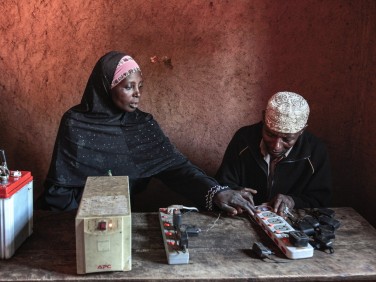 Looking to start life afresh, Maida’s family settled in Agatare and began farming a small plot of land. “We could only get one bag of beans from the land. We had no money so it was difficult to buy the extra food we needed. It was also difficult to cook because we could not buy oil,” says Maida.
Looking to start life afresh, Maida’s family settled in Agatare and began farming a small plot of land. “We could only get one bag of beans from the land. We had no money so it was difficult to buy the extra food we needed. It was also difficult to cook because we could not buy oil,” says Maida.
Their situation is not unique. Despite growing optimism about Rwanda’s future – the country is among a handful in Africa that made “especially impressive progress” on the Millennium Development Goals, according to UNDP – there is still an immensely long way to go. True, the poverty rate decreased almost 12 percent between 2006 and 2011, but an astonishingly high 24 percent of Rwandans still live in extreme poverty. And although primary education enrolment has reached almost 97 percent – the highest anywhere in Africa – secondary school enrolment continues to languish at 28 percent.
The power of savings
Hand in Hand micro-entrepreneurs join savings and loans groups organised by Hand in Hand partner CARE for lots of reasons – ambition, loneliness, desperation. For Maida, it was simple curiosity. “They said they were for poor people but I did not know if it would make a difference in our lives,” she says. “Now we are no longer isolated and lead a hopeful life. Some did not join and they are sorry now.”
“When 30 heads meet together you have 30 ideas to improve your life”
In the beginning, the group could only manage 100 RWF (US $0.14) each in savings a week. Maida bided her time, all the while attending classes to learn basic business skills. But her plan was there from the very start.
An electric idea
Almost 65 percent of Rwandans owned mobile phones in July 2013. At the same time, only about 20 percent had electricity in their homes. With a gap like that, how do you charge your phone?
If you live in Agatare, you spend 3,000 RWF (US $4) to get to the nearby town of Rwamagana, then pay to get it charged there. At least, you used to. These days, ever since Madia borrowed 50,000 RWF (US $72) from the group and bought herself a battery, you walk a few minutes and charge it for 100 RWF (US $0.14). Simple.
Maida quickly repaid her loan and bought a second battery, followed by a solar panel to keep business running while her batteries themselves go off to get charged. Today, her customers include government officials who stop by to get their laptops charged.
Hope for the future
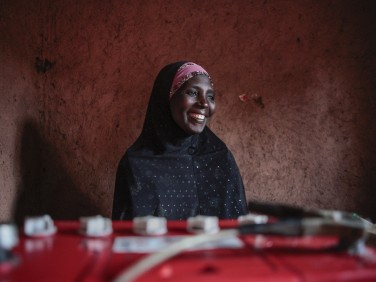 Maida still meets with her savings group each and every week.
Maida still meets with her savings group each and every week.
“We all support each other now. Today our group saves 750 RWF (US $1) each a week, plus another 50 RWF (US$0.07) for our social fund. If someone is sick or their home is damaged, or if someone is getting married then we can help,” she says.
Maida also has a savings fund of her own to make sure her daughter Mukeshimana Zamdha, 10, has the brightest future possible. “Now that I have my own business I am able to pay the 20,000 RWF (US $28) a term that it costs to send her to a good school, with all the books, bags and uniforms she needs.”
Maida’s results
![]()
Average weekly savings of 750 RWF (US $1) per member
![]()
Personal savings will send her daughter to a good school
![]()
Access to informal medical insurance
Hand in Hand Eastern Africa and CARE Rwanda are co-operating to empower some 80,000 Rwandans, mostly women, to work their way out of poverty by running their own sustainable businesses. The three-year, US $3.2 million partnership is grounded in our shared belief in the power of entrepreneurship to fight poverty.
Business as usual: Clementine’s climb from farmer to leader
It started with a pig. Then Clementine Uwimana traded up and rented out a shop. Next, she plans to build a new house with a shelter for a cow. And after that – “I am confident that any challenge I face I can solve,” she says.
Clementine’s rise from subsistence farmer to business owner and local community leader began in 2001, when she joined a local village savings group organised by Hand in Hand partner CARE.
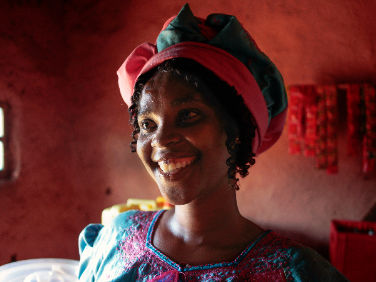 Credit is nonexistent in Clementine’s native Kabarondo, an isolated village almost 35 miles from Kigali. Skills and business training, also provided to the group, are equally unheard of (countrywide, secondary school enrolment is only 28 percent). Across the district, nearly 50 percent of Clementine’s neighbours are defined as poor. Homes are typically built out of mud and tree trunks. And less than 10 percent of people have access to electricity.
Credit is nonexistent in Clementine’s native Kabarondo, an isolated village almost 35 miles from Kigali. Skills and business training, also provided to the group, are equally unheard of (countrywide, secondary school enrolment is only 28 percent). Across the district, nearly 50 percent of Clementine’s neighbours are defined as poor. Homes are typically built out of mud and tree trunks. And less than 10 percent of people have access to electricity.
Rwanda has come an incredibly long way since the 1994 genocide claimed some 800,000 lives. According to the World Bank’s 2017 ‘Doing Business’ report, the country is now the 56th best in the world in terms of overall ease of doing business, ranking second in Africa behind only Mauritius. Still, the east African country has an immeasurably long way to go: more than 80 percent of the working population remains engaged in agriculture, many at the subsistence level, while some 29 percent of Rwandans are considered undernourished by the International Food Policy Research Institute.
Kabarondo, Rwanda
Open for business
In a place like Kabarondo, belonging to a savings group can make all the difference. “The trainer gave me the training and confidence to take a loan of 35,000 Rwandan francs (US $35),” says Clementine.
“I am confident that any challenge I face I can solve”
The 30-year-old used the loan to buy a pig, which she later sold for 70,000 RWF (US $100). The money was enough to pay off her loan and invest in stock for her shop, which today sells everything from beans and charcoal to potatoes and cabbages that Clementine grows herself. With the 2,500 RWF (US $4) she earns in profit each day, Clementine has begun to make a more comfortable life – literally.
“I have bought a mattress and a bed,” she says. “And because important people come to visit me I have also bought cups and plates.” Her most recent purchase, corrugated iron for the roof of her house, stands in the corner of the shop waiting to be installed.
A bright future
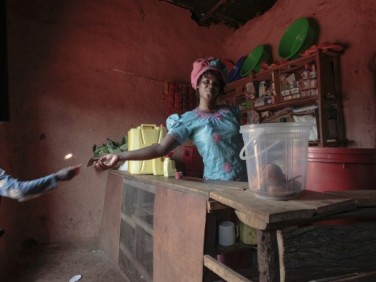 Lately, Clementine’s shop has become more than a place to buy goods, doubling as a buzzing gathering place.
Lately, Clementine’s shop has become more than a place to buy goods, doubling as a buzzing gathering place.
“Most of the problems the women face in the village are discussed in my shop. Local government officials also come to visit me and discuss ideas to improve the community,” says Clementine. Of course, her decision to brew and sell sorghum, a local beer, hasn’t hurt either. As Kabarondo’s leading retailer, she is hopeful about the future. “I am happy. If I work hard I can get everything I want.”
Clementine’s results
![]()
2,500 RWF (US $4) profit per day
![]()
Planning to build a new house
![]()
Newfound influence in the local community
Hand in Hand Eastern Africa and CARE Rwanda are co-operating to empower some 100,000 Rwandans, mostly women, to work their way out of poverty by running their own sustainable businesses. The three-year, US $3.2 million partnership is grounded in our shared belief in the power of entrepreneurship to fight poverty.
Meet Gloria, the former refugee growing crops – and profits
It took 15 years for Gloria Kabagwira to get back to her native Rwanda. With the right training and access to credit, it only took three more for the 46-year-old to become one of her district’s most successful farmers.
A country of farmers
Rwanda is on the rise. In its efforts to meet the Millennium Development Goals, says the UN, the country was “top-performing”. But despite a sizeable mining sector and ambitious government plans to electrify 70 percent of homes and businesses by 2017, Rwanda’s economy remains overwhelmingly agricultural. Almost 80 percent of the population is engaged in farming, most at the subsistence level.
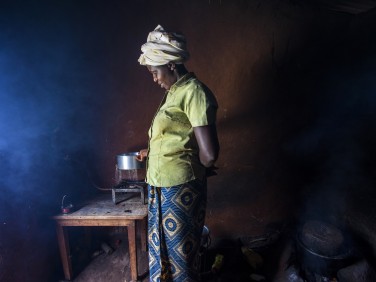 Gloria’s village is no exception. Here in Mpanga, some 12 miles from the nearest paved road, homes are made from mud bricks, electricity is non-existent and the nearest water pump is a good half-mile away. “And it’s not good water,” she says.
Gloria’s village is no exception. Here in Mpanga, some 12 miles from the nearest paved road, homes are made from mud bricks, electricity is non-existent and the nearest water pump is a good half-mile away. “And it’s not good water,” she says.
Twenty years ago, the Rwandan genocide claimed an estimated 800,000 lives. Another 800,000 people were displaced. Gloria, who returned from Tanzania in 2009 after the government promised her a free hectare of land, was among them. “When we came back we were poor. The government gave us the land but we did not know how to use it,” she says. “We survived because in this area it is easy to grow bananas and maize. Not much else, though.”
Mpanga region, Rwanda
Life savings
Things began to change in 2011 when Gloria joined a local community savings group, compelled by a mixture of curiosity and desperation. For the first time in her life, the mother of eight had access to skills and business training.
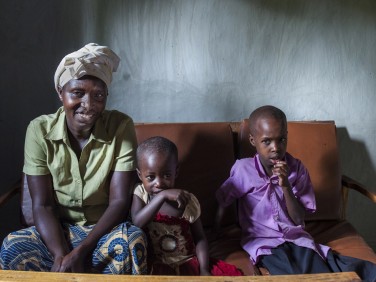 Crucially, she could also access credit via the group fund. “I contributed 400 Rwandan Francs (US $0.60) a week by working in the fields,” she says. “It wasn’t easy, but it was worth it.” Before long, the 30-strong group was ready to start lending. Gloria, meanwhile, was ready to borrow. “I was growing a few crops to eat but I knew that if I grew tomatoes and cabbages then I would be able to sell them, so I took a loan from the group of 25,000 RWF (US $36) to buy tomato seedlings,” she says. “It was a lot. I was afraid how to pay it back, it was so big.” But pay it back she did. Today, Gloria’s crops bring in some 500,000 RWF (US $720) a season, $250,000 RWF (US $360) in pure profit. And she isn’t stopping there.
Crucially, she could also access credit via the group fund. “I contributed 400 Rwandan Francs (US $0.60) a week by working in the fields,” she says. “It wasn’t easy, but it was worth it.” Before long, the 30-strong group was ready to start lending. Gloria, meanwhile, was ready to borrow. “I was growing a few crops to eat but I knew that if I grew tomatoes and cabbages then I would be able to sell them, so I took a loan from the group of 25,000 RWF (US $36) to buy tomato seedlings,” she says. “It was a lot. I was afraid how to pay it back, it was so big.” But pay it back she did. Today, Gloria’s crops bring in some 500,000 RWF (US $720) a season, $250,000 RWF (US $360) in pure profit. And she isn’t stopping there.
A capital idea
Between her own savings and help from the Rwandan government’s agricultural grants scheme, also facilitated by the group, Gloria has managed to build a water reservoir and instal her own biogas system, erasing the need to forage for fuel. She’s also expanded her acreage to grow passion fruit and papaya.
She credits her new income with much more than an improved quality of life. “In Rwanda, if you are a woman you look to everything from your husband. If you need salt, soap or clothes you must ask. You feel like you don’t have value,” she says. “Today I no longer have to beg from my husband. We share responsibility.”
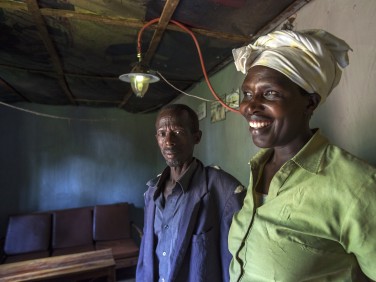 For all her success, Gloria has even bigger plans for her children:
For all her success, Gloria has even bigger plans for her children:
“I don’t want them to cultivate vegetables. I want them to get a good education and learn to speak English so that they can get good jobs.”
Gloria’s results
![]()
250,000 RWF (US $360) in pure profit per season
One of her district’s most successful farmers
![]()
Greater financial autonomy within the family
Hand in Hand Eastern Africa and CARE Rwanda are co-operating to empower some 100,000 Rwandans, mostly women, to work their way out of poverty by running their own sustainable businesses. The three-year, US $3.2 million partnership is grounded in our shared belief in the power of entrepreneurship to fight poverty.
Reaping what she sews: Odette Mukarusagara
Odette Mukarusagara still can’t believe it. “Local government officials come to visit me as a senior and respected member of the community, my neighbours trust me. I’m even on one of the senior committees of the National Women’s Council,” says the 43-year-old, incredulous.
It’s a far cry from two years ago, when Odette and her family survived off a small patch of land in Kiziguro, a rural village in Rwanda’s Eastern Province, growing beans, maize and bananas. “Honestly, our crops were only for food. They did not give us an income,” says the married mother of four. Most days they only ate once.
Odette tried her best to supplement the family income by making and selling clothes, but without enough startup capital – and even less business knowledge – soon found her efforts unravelling. Something had to change.
A helping hand
In early-2012, it finally did. Using what little income she’d earned selling clothes, Odette bought into a Village Savings and Loans (VSL) group organised by Hand in Hand partner CARE where members learned the basics of business and money management – saving, borrowing, paying loans back. Across Eastern Province, the groups are contributing to progress the UN Development Programme calls “especially impressive”.
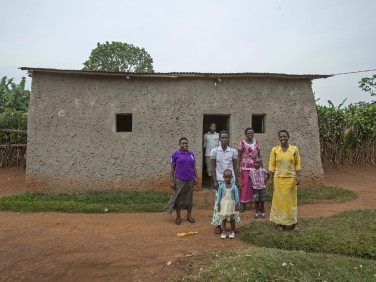 There can be no doubt the country has come an immensely long way since 1994,when genocide claimed some 800,000 lives – about 20 percent of the total population – in just 100 days. But for every reason to be optimistic there’s a corresponding reminder of how far the country has left to go.
There can be no doubt the country has come an immensely long way since 1994,when genocide claimed some 800,000 lives – about 20 percent of the total population – in just 100 days. But for every reason to be optimistic there’s a corresponding reminder of how far the country has left to go.
True, the poverty rate decreased almost 12 percent between 2006 and 2011, but an astonishingly high 24 percent of Rwandans still live in extreme poverty. Likewise, although primary education enrolment has reached almost 99 percent – the highest anywhere in Africa – secondary school enrolment continues to languish at 28 percent.
Kiziguro, Rwanda
Urban-rural divide
The urban-rural divide is another cause for concern. Countrywide, poverty is three times greater outside Rwanda’s cities, and Odette’s district is no exception.
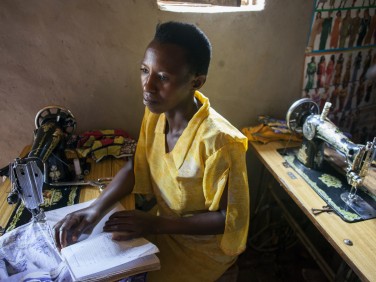 Here, just an hour-and-a-half’s drive from Kigali, homes are built out of mud-covered tree trunks and only 2.5 percent of people use electric lighting. Not surprisingly, formal sources of finance are vanishingly rare.
Here, just an hour-and-a-half’s drive from Kigali, homes are built out of mud-covered tree trunks and only 2.5 percent of people use electric lighting. Not surprisingly, formal sources of finance are vanishingly rare.
Unless, of course, you belong to a savings group. Odette borrowed 50,000 Rwandan francs (US $70) from the VSL group’s fund and quickly set about establishing her clothing business. Equipped with capital and newfound savvy, the budding micro-entrepreneur devised a plan to sell school uniforms to coincide with an upcoming term. They quickly sold for 100,000 RWF (US $140) – more than enough to cover her loan and invest in future growth. Odette was in business.
Future sewn up
Today, Odette owns four sewing machines, runs a sewing school and earns 50,000RWF (US $70) a month. Her success has inspired competition, but as the only tailor in her village with access to a nearby co-operative boasting more advanced machines, the tailor-cum-teacher isn’t worried. Perhaps best of all, subsistence farming is a thing of the past. “We employ others to work the land for us, we can buy things we can’t grow such as oil and we have more food,” says Odette.
“Local government officials come to visit me as a senior and respected member of the community, my neighbours trust me. I’m even on one of the senior committees of the National Women’s Council”
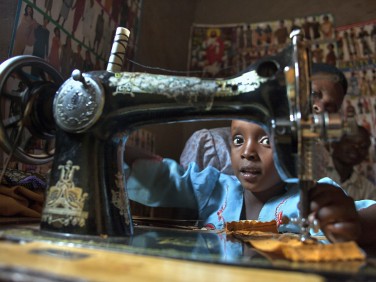 More time, too, most of which has gone into expanding her business. With help from her Hand in Hand trainer, Odette has already started saving for new space and machines for students. The resulting income, she says, will ensure an even brighter future for her five-year-old daughter, Divine.
More time, too, most of which has gone into expanding her business. With help from her Hand in Hand trainer, Odette has already started saving for new space and machines for students. The resulting income, she says, will ensure an even brighter future for her five-year-old daughter, Divine.
“Now that we have a regular income I’ll be able to afford the fees, clothes, books and bags for secondary school and university,” says Odette.
Odette’s results
![]()
Monthly earnings 50,000 RWF (US $70)
![]()
Earnings covered loan and investments for future growth
![]()
Able to afford secondary school and university for her daughter
Hand in Hand Eastern Africa and CARE Rwanda are co-operating to empower some 80,000 Rwandans, mostly women, to work their way out of poverty by running their own sustainable businesses. The three-year, US $3.2 million partnership is grounded in our shared belief in the power of entrepreneurship to fight poverty.

